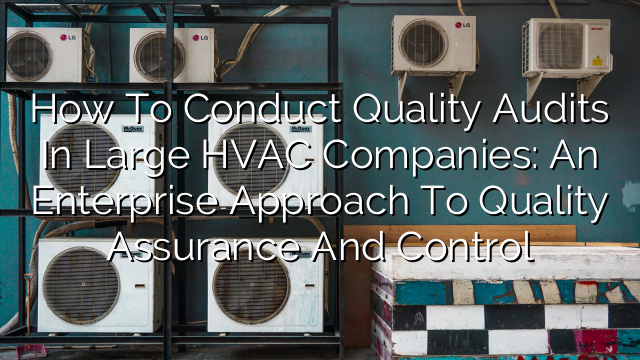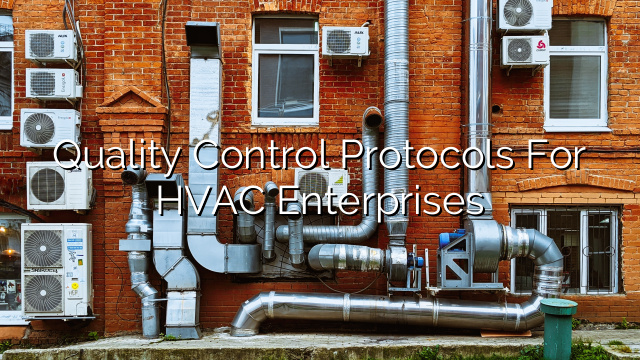Introduction
When it comes to managing the HVAC systems of multiple locations within an enterprise, there are many challenges that arise. From ensuring consistent temperature control and air quality to optimizing energy efficiency and minimizing downtime, enterprise HVAC management requires a comprehensive approach.
The Importance of Quality Control
Quality control is essential in enterprise HVAC management to ensure that all locations are providing a comfortable and healthy environment for employees and customers. It also helps to prevent costly repairs, reduce energy waste, and maintain regulatory compliance.
Challenges of Enterprise HVAC Management
Managing HVAC systems across multiple locations presents various challenges. Some of them include:
- Geographical Variations: Different locations may have different climate conditions, which can impact the design and maintenance requirements of HVAC systems.
- Different Space Needs: Locations within an enterprise may vary in terms of floor area, architecture, and ventilation needs, making it challenging to find standard solutions.
- Consistent Performance: Maintaining consistent HVAC performance across locations is crucial to ensure a uniform level of comfort and air quality.
- Accessibility: Accessibility to HVAC systems and controls can vary across locations, making it difficult to manage and monitor them effectively.
- Regulatory Compliance: Different locations may have different regulations and requirements for HVAC operation and maintenance, necessitating careful adherence.
Best Practices for Enterprise HVAC Management
To ensure quality and consistency across multiple locations, enterprises should adopt these best practices:
- Centralized Monitoring and Control: Implementing a centralized system to monitor and control HVAC systems across all locations can provide real-time visibility and control.
- Standardization: Develop standardized HVAC designs, maintenance procedures, and equipment specifications to ensure consistency and simplify management across locations.
- Regular Maintenance: Implement a proactive maintenance schedule to prevent system failures and optimize energy efficiency.
- Remote Monitoring: Utilize remote monitoring technologies to detect and diagnose HVAC issues remotely, reducing downtime and improving responsiveness.
- Vendor Management: Establish strong relationships with HVAC service vendors to ensure prompt and reliable support in case of emergencies.
- Employee Training: Train facility management staff across all locations on HVAC system operation, maintenance, and troubleshooting, empowering them to address common issues.
- Data Analysis: Use data analytics to identify trends, optimize energy usage, and proactively address potential maintenance issues or failures.
- Regular Auditing: Conduct regular audits of HVAC systems across locations to identify any operational inefficiencies or non-compliance with regulations.
Keeping Energy Efficiency in Mind
Eco-friendliness and energy efficiency are critical considerations for any enterprise HVAC management strategy. Implementing energy-saving technologies and practices not only reduces environmental impact but also lowers operational costs. Some key energy-saving measures include:
- Upgrading to Energy-Efficient Systems: Replace old HVAC systems with energy-efficient models that meet regulatory standards.
- Smart Thermostats and Zoning: Implement smart thermostats and zoning systems to optimize temperature control and energy usage based on occupancy and usage patterns.
- Proper Insulation and Sealing: Ensure proper insulation and sealing of buildings to prevent energy loss and improve overall HVAC system efficiency.
- Regular Filter Replacement: Schedule regular filter replacements to maintain optimal airflow and prevent system strain.
- Occupancy Sensors and Timers: Install occupancy sensors and timers to automatically adjust HVAC settings based on space occupancy and operating hours.
Benefits of Enterprise HVAC Management
Adopting an effective enterprise HVAC management strategy offers several benefits:
- Consistent Comfort: Employees and customers can enjoy a comfortable and productive environment across all enterprise locations.
- Improved Air Quality: Properly maintained HVAC systems ensure good indoor air quality, reducing the risk of respiratory illnesses and allergies.
- Reduced Energy Costs: Optimizing HVAC system performance and implementing energy-saving measures lead to lower energy consumption and reduced operational costs.
- Minimal Downtime: Proactive maintenance and remote monitoring help minimize HVAC system failures and associated downtime.
- Streamlined Compliance: Having standardized procedures and proactive compliance measures in place ensures adherence to regulations and avoids penalties.
FAQs
- Q: What is the role of remote monitoring in enterprise HVAC management?
A: Remote monitoring allows facility managers to monitor HVAC system performance, detect issues, and diagnose problems remotely. It helps to reduce downtime and improve responsiveness, resulting in optimized performance and reduced maintenance costs.
- Q: How can I ensure HVAC system standardization across multiple enterprise locations?
A: To ensure standardization, develop a set of guidelines, designs, and maintenance procedures that all locations must follow. Implement a centralized monitoring and control system to ensure consistency in operation and performance.
- Q: How often should HVAC systems in enterprise locations be audited?
A: It is recommended to conduct regular audits at least once a year to identify operational inefficiencies, non-compliance with regulations, and potential maintenance issues.
- Q: Can enterprise HVAC management reduce energy costs?
A: Yes, implementing energy-saving measures and optimizing HVAC system performance can significantly reduce energy costs. Upgrading to energy-efficient systems, implementing smart thermostats and zoning, and improving insulation are some key strategies to achieve energy savings.
- Q: Is employee training necessary for effective enterprise HVAC management?
A: Employee training is essential to empower facility management staff in addressing common HVAC system issues and performing basic troubleshooting. It helps to minimize downtime and ensure prompt maintenance and repairs.







